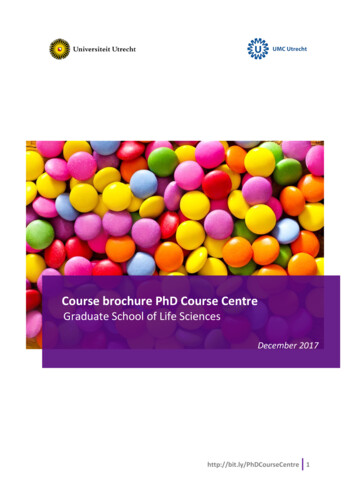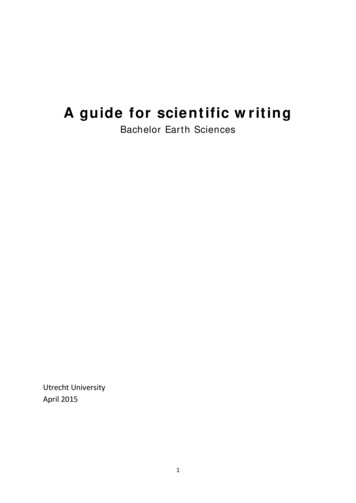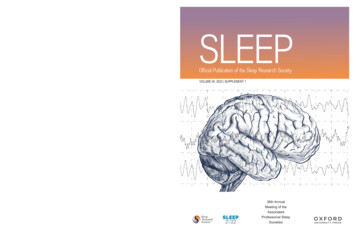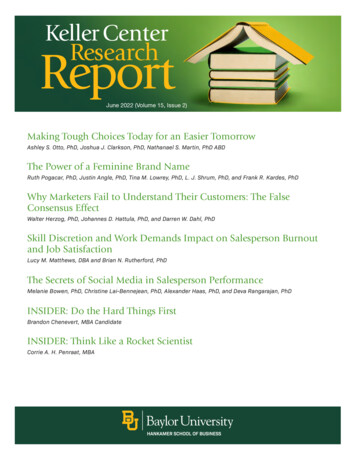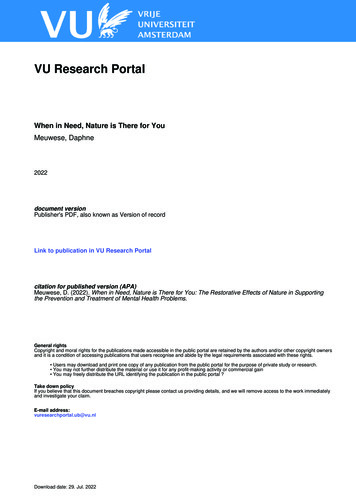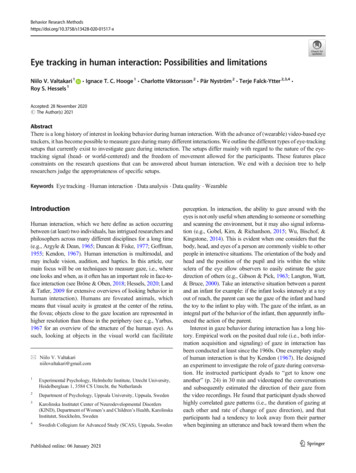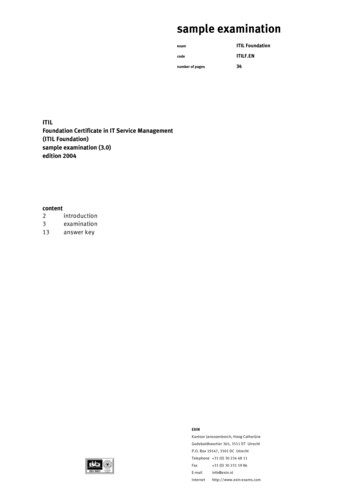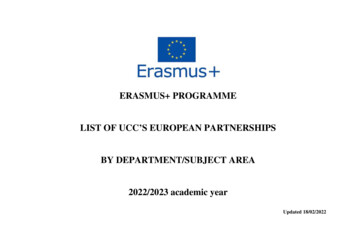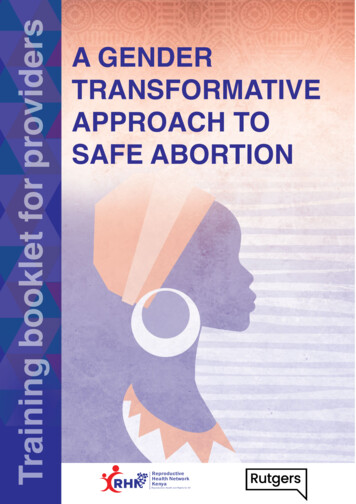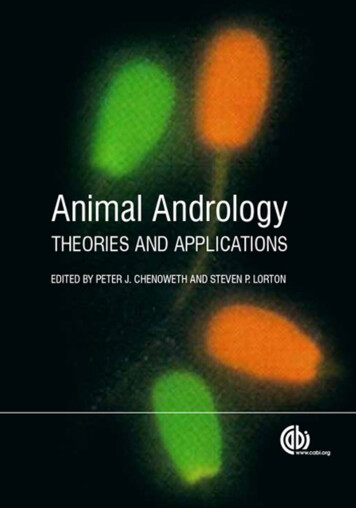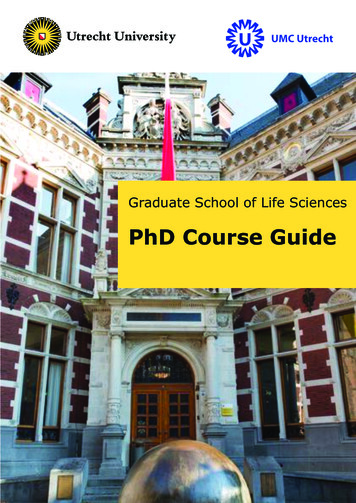
Transcription
Graduate School of Life SciencesPhD Course Guide
ColophonApril 2020Editor: Charlotte Steenbrink & Franka de JongDesign: Graduate School of Life SciencesCover photography: Bert SpiertzPrinting: Repro & Drukwerk, UMC UtrechtEdition: 2020This PhD Course Guide was composed by the Graduate School of LifeSciences of Utrecht University. This PhD Course Guide was compiled withthe utmost care, but is for information purposes only and no rights canbe derived from its contents. Suggestions regarding the content can beemailed to pcc@uu.nl.ContactGraduate School of Life SciencesHijmans van den Bergh Building, Room 4.51 WestUniversiteitsweg 983584 CG UtrechtThe Netherlandsgs.lifesciences@uu.nl
PhD Course GuideGraduate School of Life SciencesUtrecht University
INTRODUCTIONThe Graduate School of Life Sciences4Utrecht University has organized its master and PhD education in six Graduate Schools: Graduate School of Humanities Graduate School of Law, Economics and Governance, Graduate School of Social & Behavioural Sciences Graduate School of Geosciences Graduate School of Natural Sciences Graduate School of Life SciencesOf these, the Graduate School of Life Sciences (GSLS) is the only interfaculty graduateschool, offering the research master programmes of Biomedical Sciences and Biosciencesand all PhD candidates of the UMC Utrecht, the Faculty of Veterinary Medicine, the BijvoetInstitute for Biomolecular Research, the Institute for Pharmaceutical Sciences, the Instituteof Environmental Biology, and the Institute of Biodynamics and Biocomplexity of the Facultyof Science. Moreover, PhD candidates who work at other institutions under supervision ofan Utrecht University professor (promotor) also participate in the GSLS. These include theHubrecht Institute and the Princess Máxima Center.MissionThe mission of the GSLS is to improve life, by providing an inspiring and innovative academicenvironment that enables our graduates to thrive in the dynamics of life sciences and society.The GSLS graduate:Is an interdisciplinary critical thinker and worker,Creates impact in the dynamics of science and society,Demonstrates integrity towards science and society,Shows leadership,Is a team player,Is a life long learner.
VisionWe aim to achieve this by providing: PhD programmes tailored to the needs of science and society, based on Utrecht LifeSciences’ research themes and according to the prevailing (inter)national standards; an academic environment to develop professional competences with a distinct profile andtailored to individual needs and talents; and inspiring and state-of-the-art teaching and supervision by a qualified team that activelyand effectively facilitates academic and personal growth.5Thus, GSLS graduates are more than scientists suited for an academic career. Rather,we envision that they find their way in various roles inside or outside academia, therebycontributing to solutions for today’s societal needs. To this end, it is vital that PhD candidatesacquire both scientific and professional knowledge and skills during their PhD track.Scientific knowledge and skills are acquired while conducting research projects under theguidance of excellent scientists and through participation in one of the 14 thematic PhDprogrammes, which encompass a total of 1,750 PhD candidates. Professional knowledgeand skills can be developed through participation in courses provided by the PhD CourseCentre and other organisers at the Utrecht Science Park, which can be found on the CourseCentre’s online agenda: bit.ly/PhDCourseCentre.PhD education: who are we?Prof. Toine Egberts, PhDSaskia Ebeling, tor, Doctoral EducationManaging Director,Doctoral Education &PhD Course CentreAnke Hammerschlag, PhDCharlotte Steenbrink, BScpcc@uu.nlpcc@uu.nlCoordinator, PhD CourseCoordinator, PhD CourseCentreCentre
PHD COMPETENCE MODEL6The development of transferable skills becomes increasingly important in pursuit of acareer inside or outside academia. As a PhD candidate, you are challenged to model yourpersonal learning process to be well-equipped for your next step. The PhD CompetenceModel helps you to develop a set of defined and useful competences. The accompanyingself-assessment tool provides a structured framework and can be accessed viaphdcompetencemodel.nl. The PhD Course Centre offers a wide array of courses, tailoredto develop the competences described in this model.
Research Skills & KnowledgeThe expertise to formulateclear research questions andhypotheses and to designsolid research protocols.Demonstration of knowledgeabout the field and about thechallenges that lie ahead.Responsible Conduct of ScienceThe ability to make soundethical and legal choices basedon accepted professionalresearch practices, relevantpolicies and guidelines.Awareness of the resourcesavailable, should ethicalconcerns arise.Personal EffectivenessThe capability to adaptpersonal qualities andbehaviours to achieveimproved results.Demonstration of effectiveperformance under timepressure, disappointment andopposition.CommunicationDemonstration ofinterpersonal, written, verbal,listening and non-verbalcommunication skills, enablingeffective and appropriatecommunication to colleagues,public and media.Professional DevelopmentThe ability to improveprofessional skills tofurther career prospects.Development of a networkand professional goalsnecessary for a career insideor outside of academia.Leadership & ManagementThe skill to manage anddevelop project ideas aswell as to facilitate effectiveteam work including problemsolving skills and mentoringskills.TeachingThe capability to definelearning outcomes for thetarget group as well asadequately and suitablyconvey the material in amotivational manner.PhD SupervisionThe expertise to offersupervision to PhD candidatesof the SLS more efficientlyand effectively, enabling PhDcandidates to work towardstheir goals.7
COURSE TIMELINE8PHD STAGE 1Research Skills & KnowledgeResponsible Conduct of SciencePersonal EffectivenessCommunicationLeadership & ManagementPHD STAGE 2
You will need some competences at the start of your PhD, while you will want to develop othercompetences later on. This timeline will help you decide which courses to follow in whichstage of your PhD. PhD stage 1 is the start of your PhD, when you are planning and setting up your researchproject. This equals roughly the first year. PhD stage 2 is the middle of your PhD, when you are doing your research, start writingyour articles and attend conferences. This equals roughly the second and third year. PhD stage 3 is the end of your PhD, when you are finalising your thesis and are preparingfor the career after your PhD. This equals roughly the fourth year.PHD STAGE 3AFTER YOUR PHDProfessional DevelopmentTeachingPhD Supervision9
COURSE OVERVIEWResearch Skills & KnowledgeIntroduction to Epidemiology (- ONLINE)Introduction to R and Data1314-1516Introduction to Statistics (- ONLINE)17-18Introductory Biostatistics for Researchers (- ONLINE)19-20Modern Methods in data analyses (- ONLINE)21-22Statistics in the Lab: in vivo et in vitroStudy Design in Etiologic Research (- ONLINE)Systematic Literature Searchers2324-2526Responsible Conduct of Science29Digital Pictures & Data Design30Handling personal data in research31Integrity in the workplace: how to do good research?32Introduction to Research Data Management - ONLINE33Learn to Write your Data Management Plan - ONLINE34Quick Start to Research Data Management35This Thing Called Science36Improve your online presence37Personal Effectiveness39Achieving your Goals and Performing more Successfully in your PhD40Influencing & Conflict Styles41Mindfulness and Stress Reduction42Psychological Flexibility43Tackle your stress with mindfulness44Working Consciously and Effectively45Your Personal Development and Competences46Communication49Academic Writing in English50Analytic Storytelling51Breaking Science52Giving Effective l Communication56
Schrijf een Proefpersoon-Informatiebrief (Dutch only)57Science Communication: Relevant and Clear58The Art of Presenting Science59The Art of Scientific WritingWriting a Scientific Paper (- ONLINE)6061-62Writing for Academic Publication63Writing Successful Grant Proposals - ONLINE64Professional Development67BioBusiness Summer School68Exploring the job market & networking69Future crafting70LinkedIn Advanced71LinkedIn Basics72PhD Activating Career Event (PhACE)73PhD Day - Graduate School of Life Sciences74Preparing a job interview75Research Funding Days76Self-analysis for Career Orientation77Selling your Science78Transferable skills79Writing a CV and cover letter80Leadership & Management83Manage your supervisor84Research Planning and Time Management85What’s your team role?86Teaching89Start to Teach90Supervising Research of MSc students91Supervision of Master’s students92Supervision of High School students93PhD SupervisionSupervising PhD Candidates at the Graduate School of Life Sciences9596
12
RESEARCH SKILLS&KNOWLEDGE13‘‘You can pause the coursewhenever you want andrepeat many times. Veryhelpful for students withdifferent pre-knowledgelevels and for non-nativeEnglish speakers.”- PhD candidate aboutIntroductory Biostatisticsfor Researchers - ONLINE‘‘This interactive workshopprovides you with thebackground and resourcesneeded to become a searchexpert.”- PhD candidate aboutSystematically Searchingthe Literature
Introduction to Epidemiology143284-LEVELECweekshours timeinvestmenttraineesmaxbeginner/intermediateThis course gives an insight in the basic terminology and principles used inepidemiology. Also, the principles of bias and confounding are addressed.Learning objectivesThis course provides insight in the basic terminology and principles used in epidemiology. Youwill learn different aspects of epidemiological research and to apply the correct measures offrequency and association belonging with the different epidemiological study designs.Instructional methodThe face-to-face course is a two-week full-time course with lectures, exercises and self-study.You are required to complete the practical exercises (self-study), students should attend at least80% of the classes in the course and pass the exam.About the trainerThe trainer of this course is Dr. Patrick Souverein, a teacher of theMaster’s programme Epidemiology.
Introduction to Epidemiology- ONLINE1.5342-LEVELECweekshours timeinvestmenttraineesmaxbeginner/intermediateThis course gives an insight in the basic terminology and principles used inepidemiology. Also, the principles of bias and confounding are addressed.Learning objectivesThis course provides insight in the basic terminology and principles used in epidemiology. Youwill learn different aspects of epidemiological research and to apply the correct measures offrequency and association belonging with the different epidemiological study designs.Instructional methodThe online course is a 3 week part-time course with a study load of 14 hrs/w. Web lectures,articles, assignments and group discussions are the learning methods that will be used. Thereare interim deadlines and the course ends with an exam.About the trainerThe trainer of this course is Dr. Patrick Souverein, a teacher of theMaster’s programme Epidemiology.15
Introduction to R and Data160.318-LEVELECsessionhours timeinvestmenttraineesmaxbeginner/intermediateR is a powerful scripting language for data handling, data visualisation, and statistics.In this workshop, we explain the tools to start exploring R and all it has to offer.Learning objectivesThe course will take you from the very basics in R syntax to data handling and visualisationusing a recently designed set of tools known as the ‘tidyverse’. Furthermore, you will learn aboutthe datasets and their architecture, preparing you to handle your own data in a clean, robust,and reproducible manner. We will work in RStudio and use both R and R Markdown: the latteris a great way to combine code and its output with text, allowing you to code in a narrativeand intuitive way. You will learn to read and write the lines of R code and to read, manipulate,transform, save and visualise a dataset using tidyverse tools. Finally, you will learn to generate‘tidy’ data and to write an R script and an R Markdown document.About the trainerData specialists from Utrecht University Library.
Introduction to Statistics1.5142-LEVELECsessionssessionhours mediateyearThe course will provide you with a basic understanding of statistics and enables you tointerpret research data, and to explain and use different types of variables.Learning objectivesThis course explains and uses the different types of variables: quantitative (numerical) vsqualitative (non-numerical) with their corresponding sub-types (continuous, discrete, ordinal,non-ordinal). You will learn how to interpret univariate graphs and calculate descriptive statistics,(standard) normal and binomial probabilities and confidence intervals. At the end of the courseyou can perform simple statistical analyses in the statistical packages SPSS and R.Instructional methodThis face-to-face course is a blended course with e-lectures, self-study and face-to-facecomputer labs. The course ends with an exam.About the trainerCas Kruitwagen, MSc, studied Mathematics at Utrecht University and isspecialized in statistics. He works as Assistant Professor at the Julius Centerfor Health Sciences and Primary Care of the University Medical CenterUtrecht. As education coordinator of the Biostatistics department his mainactivities consist of developing, coordinating and teaching statistics classes,with a growing emphasis on blended and online education.17
Introduction to Statistics- ONLINE181.5342-LEVELECweekshours timeinvestmenttraineesmaxbeginner/intermediateThe course will provide you with a basic understanding of statistics and enables you tointerpret research data, and to explain and use different types of variables.Learning objectivesThis course explains and uses the different types of variables: quantitative (numerical) vsqualitative (non-numerical) with their corresponding sub-types (continuous, discrete, ordinal,non-ordinal). You will learn how to interpret univariate graphs and calculate descriptive statistics,(standard) normal and binomial probabilities and confidence intervals. At the end of the courseyou can perform simple statistical analyses in the statistical packages SPSS and R.Instructional methodIn this online course, web lectures, assignments and group discussions are the learning methodsthat will be used. There are interim deadlines and the course ends with an exam.About the trainerCas Kruitwagen, MSc, studied Mathematics at Utrecht University and isspecialized in statistics. He works as Assistant Professor at the Julius Centerfor Health Sciences and Primary Care of the University Medical CenterUtrecht. As education coordinator of the Biostatistics department his mainactivities consist of developing, coordinating and teaching statistics classes,with a growing emphasis on blended and online education.
Introductory Biostatistics forResearchers4.51012620LEVELECsessionshours timeinvestmenttraineesmaxbeginner/intermediateThis course provides an introduction to statistical methodology and discusses anumber of statistical techniques for practical data analysis.Learning objectivesThis course provides an introduction to statistical methodology and discusses a number ofstatistical techniques for practical data analysis, including T tests, Chi-square tests, analysis ofvariance (ANOVA), (multiple) linear and logistic regression and survival analysis. You will useconcrete examples and case studies to apply the theory to practical situations. The course endswith a group assignment in which you analyse a case study, using the newly acquired statisticaltechniques.Instructional methodIn general, the daily schedule of our course includes morning lectures, followed by computersessions in the afternoon. You will use examples from medical and biological research in theexercises. You will analyse data sets on computers, using the statistical software packages R andSPSS.About the trainerCas Kruitwagen, MSc, studied Mathematics at Utrecht University and isspecialized in statistics. He works as Assistant Professor at the Julius Centerfor Health Sciences and Primary Care of the University Medical CenterUtrecht. As education coordinator of the Biostatistics department his mainactivities consist of developing, coordinating and teaching statistics classes,with a growing emphasis on blended and online education.19
Introductory Biostatistics forResearchers - ONLINE204.51012620LEVELECsessionshours timeinvestmenttraineesmaxbeginner/intermediateThis online course provides an introduction to statistical methodology and discusses anumber of statistical techniques for practical data analysis.Learning objectivesThis online course provides an introduction to statistical methodology and discusses a numberof statistical techniques for practical data analysis, including T tests, Chi-square tests, analysisof variance (ANOVA), (multiple) linear and logistic regression and survival analysis. You will useconcrete examples and case studies to apply the theory to practical situations. The course endswith a group assignment in which you analyze a case study, using the newly acquired statisticaltechniques.Instructional methodIn each Learning Unit (week), we explain a statistical theme, using short web lectures,alternated with computer exercises. Examples from medical and biological research will be usedin the exercises. You will analyze data sets, using the statistical software packages R and/orSPSS. Discussion forums provide a platform to discuss theory and practice exercises with thestaff and fellow participants. The Statistics Cafe serves as a virtual meeting place to discussmore general statistical questions, and to talk with your peers about your own research.About the trainerCas Kruitwagen, MSc, studied Mathematics at Utrecht University and isspecialized in statistics. He works as Assistant Professor at the Julius Centerfor Health Sciences and Primary Care of the University Medical CenterUtrecht. As education coordinator of the Biostatistics department his mainactivities consist of developing, coordinating and teaching statistics classes,with a growing emphasis on blended and online education.
Modern Methods in data analyses4.5312620LEVELECweekshours timeinvestmenttraineesmaxbeginner/intermediateThis course provides statistical methods to study the association between (multiple)determinants and the occurrence of an outcome event. The course starts withan introduction to likelihood theory, using simple examples and a minimum ofmathematics. Next, the most important regression models used in medical researchare introduced. Topics are: maximum-likelihood methods, multiple linear andlogistic regression, model validation and regression diagnostics, Poisson regression,and analysis of event-history data, including an extensive discussion of the Coxproportional hazards regression model. Also, the basic principles of resamplingmethods (bootstrapping and permutation tests) and of longitudinal data analysis aretaught.Learning objectivesAt the end of the course you can identify the situations in which the aforementioned modellingtechniques can be applied and the conditions that should be met to obtain reliable resultsusing these techniques. You are also able to explain and interpret the results obtained with thetechniques, and apply these results in practice (e.g. to answer a research question).Instructional methodThis face-to-face course is a three weeks full-time course with lectures, self-study and computerlabs. It ends with an exam.About the trainerCas Kruitwagen, MSc, studied Mathematics at Utrecht University and isspecialized in statistics. He works as Assistant Professor at the Julius Centerfor Health Sciences and Primary Care of the University Medical CenterUtrecht. As education coordinator of the Biostatistics department his mainactivities consist of developing, coordinating and teaching statistics classes,with a growing emphasis on blended and online education.21
Modern Methods in data analyses- ONLINE224.5912620LEVELECweekshours timeinvestmenttraineesmaxbeginner/intermediateThis course provides statistical methods to study the association between (multiple)determinants and the occurrence of an outcome event. The course starts withan introduction to likelihood theory, using simple examples and a minimum ofmathematics. Next, the most important regression models used in medical researchare introduced. Topics are: maximum-likelihood methods, multiple linear andlogistic regression, model validation and regression diagnostics, Poisson regression,and analysis of event-history data, including an extensive discussion of the Coxproportional hazards regression model. Also, the basic principles of resamplingmethods (bootstrapping and permutation tests) and of longitudinal data analysis aretaught.Learning objectivesAt the end of the course you can identify the situations in which the aforementioned modellingtechniques can be applied and the conditions that should be met to obtain reliable resultsusing these techniques. You are also able to explain and interpret the results obtained with thetechniques, and apply these results in practice (e.g. to answer a research question).Instructional methodThis online course is a nine weeks part-time course with a study load of 14 hrs/w. Web lectures,assignments and discussions are the learning methods that will be used. There are interimdeadlines and the course ends with an exam.About the trainerCas Kruitwagen, MSc, studied Mathematics at Utrecht University and isspecialised in statistics. He works as Assistant Professor at the Julius Centerfor Health Sciences and Primary Care of the University Medical CenterUtrecht. As education coordinator of the Biostatistics department his mainactivities consist of developing, coordinating and teaching statistics classes,with a growing emphasis on blended and online education.
Statistics in the Lab1.514224LEVELECweekhours timeinvestmenttraineesmaxbeginner/intermediateDo you ever ask yourself any of the following questions? ‘Why do I always have torepeat my experiments three times?’ ‘I clearly see effect of the treatment on cells, butno significance due to large variation. Which statistical test should I use?’ This coursewill teach the different aspects of experimental design and analysis by using veryidentifiable problems for basic scientists. You can immediately implement the skillsyou learn in your daily work. There will be ample opportunity to bring your own dataand get advice of experienced statisticians.Learning objectivesDuring this course you will learn how to design laboratory and small scale studies, includingsample size calculations. You will identify the type of data that results from your experiments.You will learn how to select the best way of analysing and interpreting your in vivo and in vitrodata and how to write a proper method section for manuscripts.Instructional methodThe course is highly interactive. It contains interactive lectures, work groups, discussions andcomputer practice. During computer practice, you will use real data from animal studies, qPCRexperiments, cell-line data, immunohistochemistry, flow cytometry, etc. to get familiar with themethods and the way to interpret the outcome of the analysis. You will make use of SPSS for theanalysis.About the trainerCas Kruitwagen, MSc, studied Mathematics at Utrecht University and isspecialised in statistics. He works as Assistant Professor at the Julius Centerfor Health Sciences and Primary Care of the University Medical CenterUtrecht. As education coordinator of the Biostatistics department his mainactivities consist of developing, coordinating and teaching statistics classes,with a growing emphasis on blended and online education.23
Study Design in Etiologic Research243284-LEVELECweekshours timeinvestmenttraineesmaxbeginner/intermediateIn this course the principles and practice of cohort, case-control and cross-sectionalstudies are taught. Design, data collection and outcome measures are discussed, aswell as the major advantages and disadvantages of the different study designs.Learning objectivesIn this course you will learn the principles, design, differences, advantages and disadvantagesof cohort, case-control and cross-sectional studies. You will get an insight in the validity aspectsand in the measures of frequency and association that can be calculated from cohort, casecontrol and cross-sectional studies.Instructional methodThis face-to-face course is a two-week full-time course with lectures, exercises and self-study.You are required to complete the practical exercises (self-study), students should attend at least80% of the classes in the course and pass the exam.About the trainerCas Kruitwagen, MSc, studied Mathematics at Utrecht University and isspecialized in statistics. He works as Assistant Professor at the Julius Centerfor Health Sciences and Primary Care of the University Medical CenterUtrecht. As education coordinator of the Biostatistics department his mainactivities consist of developing, coordinating and teaching statistics classes,with a growing emphasis on blended and online education.
Study Design in Etiologic Research- ONLINE3684-LEVELECweekshours timeinvestmenttraineesmaxbeginner/intermediateIn this course the principles and practice of cohort, case-control and cross-sectionalstudies are taught. Design, data collection and outcome measures are discussed, aswell as the major advantages and disadvantages of the different study designs.Learning objectivesIn this course you will learn the principles, design, differences, advantages and disadvantagesof cohort, case-control and cross-sectional studies. You will get an insight in the validity aspectsand in the measures of frequency and association that can be calculated from cohort, casecontrol and cross-sectional studies.Instructional methodThis online course is a 6 week part-time course with a study load of 14 hrs/w. Web lectures,group assignments and group discussions are the learning methods that will be used. There areinterim deadlines and the course ends with an exam.About the trainerCas Kruitwagen, MSc, studied Mathematics at Utrecht University and isspecialized in statistics. He works as Assistant Professor at the Julius Centerfor Health Sciences and Primary Care of the University Medical CenterUtrecht. As education coordinator of the Biostatistics department his mainactivities consist of developing, coordinating and teaching statistics classes,with a growing emphasis on blended and online education.25
Systematically Searching theLiterature26260.071220LEVELECsessionhours timeinvestmenttraineesmaxbeginner/intermediateWhen searching the literature, either for a quick answer, or a more extensive searchfor a systematic review and meta-analysis, you want to be sure you find what youneed, and don’t miss anything.Learning objectivesDuring the workshop you’ll learn how to set up a search strategy by covering the followingaspects: how to start? – from question to search strategy; where to search? – what databases touse and how to use them; and when to stop? – will this search find it all, or not During the workshop you’ll get some theoretical background on where and how to search; thesystematic approach works for all disciplines and for both short comprehensive topics as well asfor full systematic reviews.Instructional MethodAfter some theory you will work an example searches that will be discussed at the end. Wewill point out common mistakes and issues and show the most important functions of severaldatabases.About the trainerInformation specialists from Utrecht University Library.
27
28
RESPONSIBLE CONDUCTOF SCIENCE29‘‘Finally, a safe space toopenly discuss dilemmasthat I face when conductingresearch!”- PhD candidate aboutBeing a Scientist:Integrity Issues inPractice‘‘Do you have doubts,critiques or bugs aboutscience? This is a goodplace to address them. Thiscourse made me a betterscientist, and a betterinformed layman. I stronglyrecommend it to anyoneinterested in science.”- PhD candidate aboutThis Thing Called Science
Digital Pictures: Data Integrityand Display301.022825LEVELECsessionshours timeinvestmenttraineesmaxbeginner/intermediateThe output of scientific experiments often comes in the form of digital images e.g.scans of Western blots and microscopic images. This certainly has a lot of advantages,because digital images can contain spatial information and can be more telling thanplain numerical data. A disadvantage of data in the form of digital images is that theycan, often unintendedly, be manipulated using computer software in a way that is notin agreement with scientific standards. In this course we will focus on what you can doand what you shouldn’t do to get the best representation of your digital image withoutaltering the actual data.Learning objectivesAt the end of the course you will be acquainted with the theory behind digital images. You willbe able to apply image processing software and to make a publication quality figure based onvector-based software according to scientific standards.Instructional methodThe course will be given in an interactive way, with time for practicing on assignments on laptops(provided). The first day we will go into some theory behind digital images and practice with twodifferent image processing software packages. The second day we will go more into presentingyour images in publication quality figures and/or presentations using vector-based software.There will be a pre-course assignment to start getting a feeling f
The PhD Competence Model helps you to develop a set of dened and useful competences. The accompanying self-assessment tool provides a structured framework and can be accessed via phdcompetencemodel.nl. The PhD Course Centre offers a wide array of courses, tailored to develop the competences described in this model. PHD COMPETENCE MODEL 6
